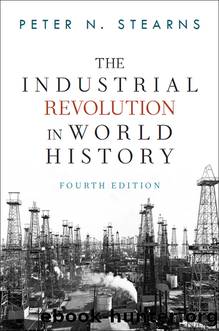The Industrial Revolution in World History by Peter N Stearns

Author:Peter N Stearns [Stearns, Peter N]
Language: eng
Format: epub
ISBN: 9780813347301
Publisher: Westview Press
Published: 0101-01-01T00:00:00+00:00
CHAPTER NINE
New Developments in Western Societies: A Second Revolution?
Redefinitions of the Industrial Economy
Changes in the industrial economies of western Europe and the United States were not as decisive as those surrounding the advent of industrialization in Russia and Japan between the 1880s and the 1950s. To speak of a second industrial revolution in the West may be misleading, for it downplays the unique significance of the initial conversion from an agricultural to an industrial economy that had already occurred. Instead, a number of developments simply completed the basic revolution in countries like the United States and Germany. (Only Britain had in any real sense fully converted to an industrial economy before the 1880s.) It was only in about 1900 that Germany became half urbanized (the marker Britain had achieved in 1850); the United States and France reached this crude measurement of extensive industrialization by 1920. Rapid growth of the industrial labor force through immigration ended in the United States only during the 1920s, and even then rural movement, including the great migration of African Americans from the South, continued to provide newcomers to the basic experience of factory work. Thus, the overlap between the essential industrial revolution and new trends surfacing in the early twentieth century was considerable.
Nevertheless, several important innovations transformed the Western industrial scene between 1880 and 1950. Earlier trends intensified to the point of unrecognizability; the pace of work, for example, accelerated well beyond anything imagined during the early industrial revolution. Furthermore, several outgrowths of initial industrialization were rethought, producing a substantially different version of the larger industrial experience.
Obviously, the process of industrialization in the West guaranteed further change even after the initial phase had ended. Geographic balances continued to shift within the industrial West. Britainâs relative decline intensified in the second major phase of the industrial revolution as Germany and particularly the United States gained ground. British iron resources were less appropriate for steelmaking, so the nations faced new challenges when steel began to predominate over iron; technical training and organizational coordination within big business lagged. Devastating losses during both world wars further hampered Britainâs standing. British industrialization proceeded, however. There was no retreat, and the British even pioneered in some new product development, establishing the first version of the television industry in the late 1930s. But the laurels of overall leadership passed elsewhere.
The industrial revolution also continued to fan out from earlier Western centers. Northern Italy and Catalonia, in northeastern Spain, accelerated their industrialization in the late nineteenth century. Catalonian factories emphasized textiles as industrialists combined relatively advanced technology with somewhat cheaper labor, in competition with earlier industrializers such as Britain. Industrialization also began to spread to the American South; the industries that grew were those in which new techniques and cheaper labor drew businesses from earlier factory centers such as New England.
Two crucial developments in the industrial West overshadowed the geographic refinements. First, more powerful technologies and production organizations spurred industrial output. Second, thanks to higher output and cheap goods from other societies, a large service sector began to emerge.
Download
This site does not store any files on its server. We only index and link to content provided by other sites. Please contact the content providers to delete copyright contents if any and email us, we'll remove relevant links or contents immediately.
International Integration of the Brazilian Economy by Elias C. Grivoyannis(111040)
The Radium Girls by Kate Moore(12022)
Turbulence by E. J. Noyes(8042)
Nudge - Improving Decisions about Health, Wealth, and Happiness by Thaler Sunstein(7697)
The Black Swan by Nassim Nicholas Taleb(7116)
Rich Dad Poor Dad by Robert T. Kiyosaki(6618)
Pioneering Portfolio Management by David F. Swensen(6294)
Man-made Catastrophes and Risk Information Concealment by Dmitry Chernov & Didier Sornette(6013)
Zero to One by Peter Thiel(5792)
Secrecy World by Jake Bernstein(4746)
Millionaire: The Philanderer, Gambler, and Duelist Who Invented Modern Finance by Janet Gleeson(4473)
The Age of Surveillance Capitalism by Shoshana Zuboff(4286)
Skin in the Game by Nassim Nicholas Taleb(4244)
The Money Culture by Michael Lewis(4201)
Bullshit Jobs by David Graeber(4183)
Skin in the Game: Hidden Asymmetries in Daily Life by Nassim Nicholas Taleb(3997)
The Dhandho Investor by Mohnish Pabrai(3763)
The Wisdom of Finance by Mihir Desai(3741)
Blockchain Basics by Daniel Drescher(3577)
